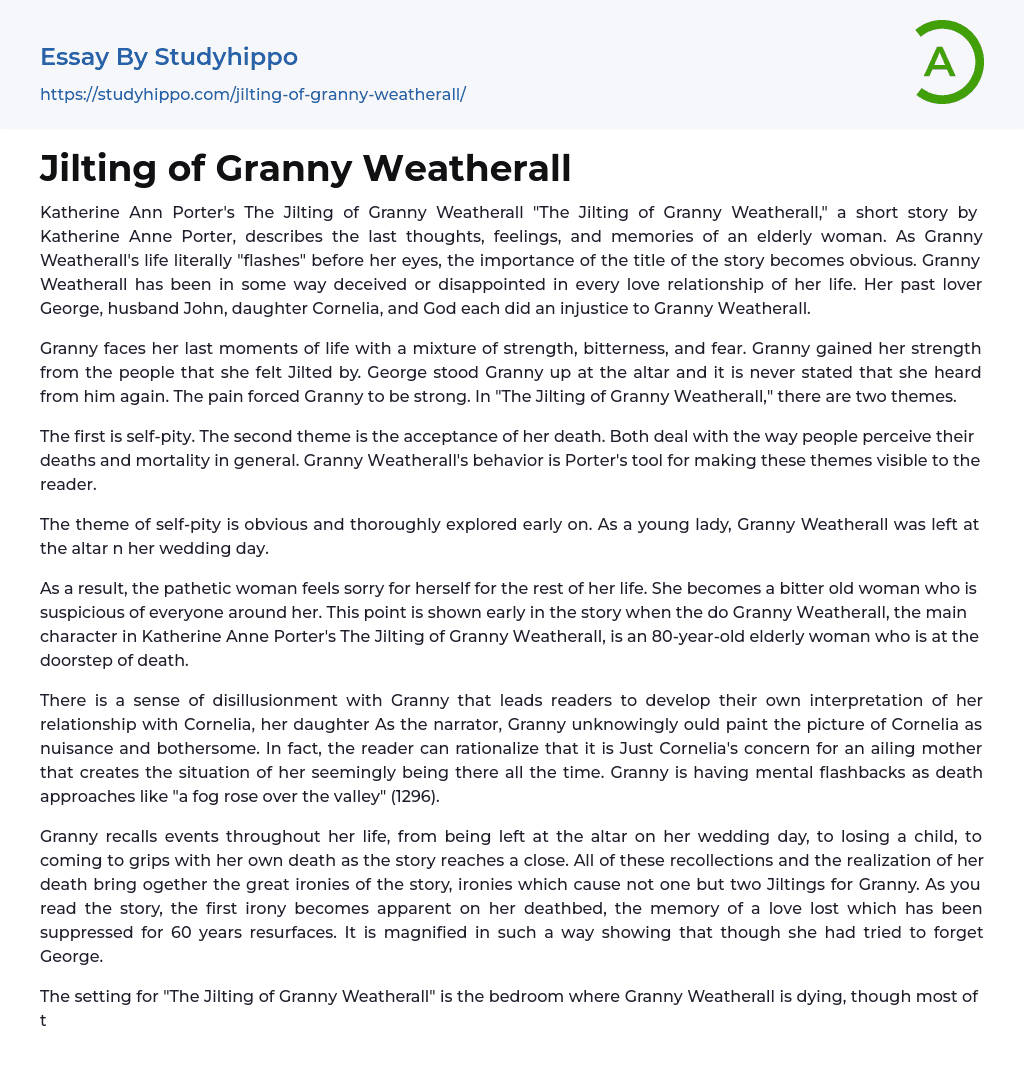Katherine Ann Porter's The Jilting of Granny Weatherall "The Jilting of Granny Weatherall," a short story by Katherine Anne Porter, describes the last thoughts, feelings, and memories of an elderly woman. As Granny Weatherall's life literally "flashes" before her eyes, the importance of the title of the story becomes obvious. Granny Weatherall has been in some way deceived or disappointed in every love relationship of her life. Her past lover George, husband John, daughter Cornelia, and God each did an injustice to Granny Weatherall.
Granny faces her last moments of life with a mixture of strength, bitterness, and fear. Granny gained her strength from the people that she felt Jilted by. George stood Granny up at the altar and it is never stated that she heard from him again. The pain forced
...Granny to be strong. In "The Jilting of Granny Weatherall," there are two themes.
The first is self-pity. The second theme is the acceptance of her death. Both deal with the way people perceive their deaths and mortality in general. Granny Weatherall's behavior is Porter's tool for making these themes visible to the reader.
The theme of self-pity is obvious and thoroughly explored early on. As a young lady, Granny Weatherall was left at the altar n her wedding day.
As a result, the pathetic woman feels sorry for herself for the rest of her life. She becomes a bitter old woman who is suspicious of everyone around her. This point is shown early in the story when the do Granny Weatherall, the main character in Katherine Anne Porter's The Jilting of Granny Weatherall, is an 80-year-old elderly woman who is a
the doorstep of death.
There is a sense of disillusionment with Granny that leads readers to develop their own interpretation of her relationship with Cornelia, her daughter As the narrator, Granny unknowingly ould paint the picture of Cornelia as nuisance and bothersome. In fact, the reader can rationalize that it is Just Cornelia's concern for an ailing mother that creates the situation of her seemingly being there all the time. Granny is having mental flashbacks as death approaches like "a fog rose over the valley" (1296).
Granny recalls events throughout her life, from being left at the altar on her wedding day, to losing a child, to coming to grips with her own death as the story reaches a close. All of these recollections and the realization of her death bring ogether the great ironies of the story, ironies which cause not one but two Jiltings for Granny. As you read the story, the first irony becomes apparent on her deathbed, the memory of a love lost which has been suppressed for 60 years resurfaces. It is magnified in such a way showing that though she had tried to forget George.
The setting for "The Jilting of Granny Weatherall" is the bedroom where Granny Weatherall is dying, though most of the action occurs in Granny's head.
Told as a stream-of-consciousness monologue, "The Jilting of Granny Weatherall" is the story of the last day in the eighty-year-old woman's life. In her final hours with her surviving impending death. Almost against her will, her thoughts return to an incident that occurred more than sixty years earlier: She was left standing alone at the altar when her fianc©
George Jilted her.
A portrait of an eighty-year-old woman on her deathbed,' 'The Jilting of Granny Weatherall" is an exploration of the human mind as it struggles to come to terms with loss and mortality. Porter offers no clear resolution to these fundamental issues, but instead interweaves themes of betrayal, religion, death, and memory in a moving and poetic character study. The titles of both the story and the anthology {Flowering Judas} in which it first appeared suggest the idea of betrayal, a central theme underlying many of Porter's stories.
Judas was the disciple who betrayed Christ with a kiss.
At the heart of "The Jilting of Granny Weatherall" are Granny's memories of her betrayal by George, the... One of the most striking stylistic aspects of 'The Jilting of Granny Weatherall" is its unusual narrative perspective.
Though the story is written in the third person, its narrative point of view is extremely close to that of the central character, Granny Weatherall. The story is told through stream-of-consciousness. Granny's thoughts are presented in a spontaneous fashion, as if readers had access to her. Jilting means you have been kept from something that was meant to be yours.
- Boo Radley essays
- Genesis essays
- Richard iii essays
- Alice in Wonderland essays
- On the road essays
- Ozymandias essays
- The Nightingale essays
- Holden Caulfield essays
- Animal Farm essays
- 1984 essays
- A Hanging essays
- Shooting An Elephant essays
- A Tale Of Two Cities essays
- Adventures Of Huckleberry Finn essays
- Arthur Conan Doyle essays
- Brave New World essays
- Characters In Hamlet essays
- Characters In Romeo And Juliet essays
- Desdemona essays
- Diary Of A Wimpy Kid essays
- First-Person Narrative essays
- Frankenstein essays
- Heart Of Darkness essays
- Jane Eyre essays
- Jay Gatsby essays
- King Duncan essays
- Librarian essays
- Little Red Riding Hood essays
- Lord Of The Flies essays
- Silas Marner essays
- The Cask Of Amontillado essays
- The Catcher In The Rye essays
- The Crucible essays
- The Handmaid's Tale essays
- The Reader essays
- Virgil essays
- Wuthering Heights essays
- Candide essays
- Castle essays
- J. D. Salinger essays
- Ulysses essays
- Ethan Frome essays
- In Cold Blood essays
- Outliers essays
- Tuesdays With Morrie essays
- The Art of War essays
- Wife of Bath essays
- Huckleberry Finn essays
- The Lady With The Dog essays
- Great Expectations essays




